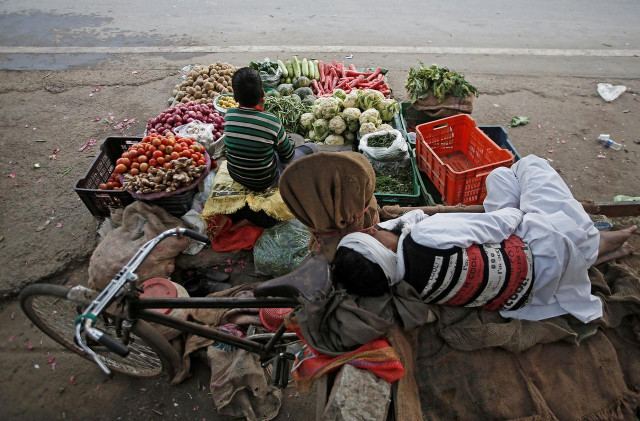Food inflation in double digits since Aug 2019
Federal govt admits high food inflation is troubling but blames provincial govts

Since August last year, food inflation in Pakistan has been in double digits. It has remained between 10.4% and 19.5% in urban areas and between 12.6% and 23.8% in rural areas, revealed the data released by the Pakistan Bureau of Statistics (PBS).
Behind these numbers lie the miseries of millions of financially poor Pakistanis—more than 10 million of them out of jobs. For September this year, the PBS reported 12.4% food inflation in urban areas and 15.8% in rural areas.
The federal government acknowledges that high food inflation is troubling for the people, especially those falling in low income brackets, but holds provincial governments largely responsible for it.
It is true that keeping a check on prices of food items is primarily the responsibility of provincial governments but to discharge this responsibility, they need federal government’s support in the form of sound fiscal policies, which remain amiss. Persistently high food inflation carries a heavy political price for the government. It is not just politically perilous but also affects the entire economy in more ways than meet the eye.
When households have to spend more on food, they are not left with much money to spend on health and education which, in turn, affects national productivity and gross domestic product (GDP) growth with a time lag.
Keeping food inflation under check is important. Commodity markets behave more erratically in countries where access to real-time information about supplies is absent or limited. Pakistan is undoubtedly one such country.
Markets come to know about final figures of domestic production of wheat, rice, maize and sugarcane almost after a year. Meanwhile, they remain vulnerable to all kinds of misinformation and disinformation on the actual supply situation and act more on hearsay rather than on the basis of solid information.
Lately, the electronic media has also made it a habit to fuel inflationary expectations with its exaggerated breaking news on weekly or monthly movements in prices of essential items. Little does it realise that on most occasions, airing of such news creates a self-fulfilling prophecy cycle as consumers and markets begin expecting inflation to move even higher and behave accordingly.
Hoarding and profiteering have become the order of the day. Political patronage ensures that the mightiest among those who create artificial shortage of sugar and wheat go scot-free and only the weakest among them such as small retailers face administrative action.
Traditionally, food prices in Pakistan also remain high because district administrations fail to ensure implementation of administered prices – or prices determined jointly by the authorities and producers at district levels. In Karachi, retail price lists which are issued routinely for such essential items like milk, yogurt, chicken, beef and mutton have lost their relevance.
There always exists a big difference between actual market prices and the official fixed prices. But local authorities generally fail to pre-empt hoarding and profiteering despite media-monitored occasional raids on shops and imposition of fines on shopkeepers. Dig deeper into this phenomenon and you will come to know that during meetings held between the city administration and producers of food items, prices are fixed as a result of a “compromise” instead of fact-based exchange of views.
Support prices
Moreover, there is the problem of political influence on the entire spectrum of agriculture. This influence has become all the more noticeable after the devolution of agriculture as a provincial subject.
Wheat and sugarcane farms are owned mostly by prominent landowners well-rooted in politics. Playing with support prices of food commodities is not an issue for them. Higher support prices obviously push up prices of food crops and, in turn, their end-products. Besides, corrupt elements in provincial food departments responsible for releasing officially procured wheat to millers do not stick to the rules of business.
The millers who grease the palms of these elements managed to get more wheat at subsidised rates and those who do not follow this practice have to rely almost solely on expensive wheat purchases from the open market. This eventually takes its toll on retail prices of wheat flour and dozens of food items made from it including bread, buns, cakes, pastries and biscuits.
Dilapidated roads, archaic railways, lack of modern storages, broken supply chain of corn, rice and pulses, scant facilities for proper animal slaughtering and absence of scientific system for tracking fluctuations in dairy, poultry and meat prices also contribute to the food inflation.
Flash floods and record heavy rainfall during this monsoon exposed these structural problems. Almost all previous governments have made half-hearted attempts to address them but their efforts bore little or no results. Wheat and sugar crisis emerges routinely year after year – and sometimes twice during a year. But the whole nation seems to have become used to them.
Gradual withdrawal or minimisation of agricultural subsidies and phased increase in prices of gas and electricity are also responsible for keeping food inflation in double digits. Food commodities’ prices are rising worldwide as food exports of countries are recovering from the record lows hit during the Covid-19-triggered lockdowns. That, too, is having an impact on domestic prices of food items.
And, last but not the least, Pakistan’s desperation to accelerate export earnings is resulting in larger shipments of food items, creating shortages in local markets and pushing up prices.
According to the PBS data, Pakistan’s export volumes of Basmati rice and fruits grew 35% and 7% respectively in FY20 from a year earlier. Outward shipments of meat and meat products also recorded 27.4% growth.
The writer is a mechanical engineer and is doing masters
Published in The Express Tribune, October 19th, 2020.
Like Business on Facebook, follow @TribuneBiz on Twitter to stay informed and join in the conversation.


















COMMENTS
Comments are moderated and generally will be posted if they are on-topic and not abusive.
For more information, please see our Comments FAQ